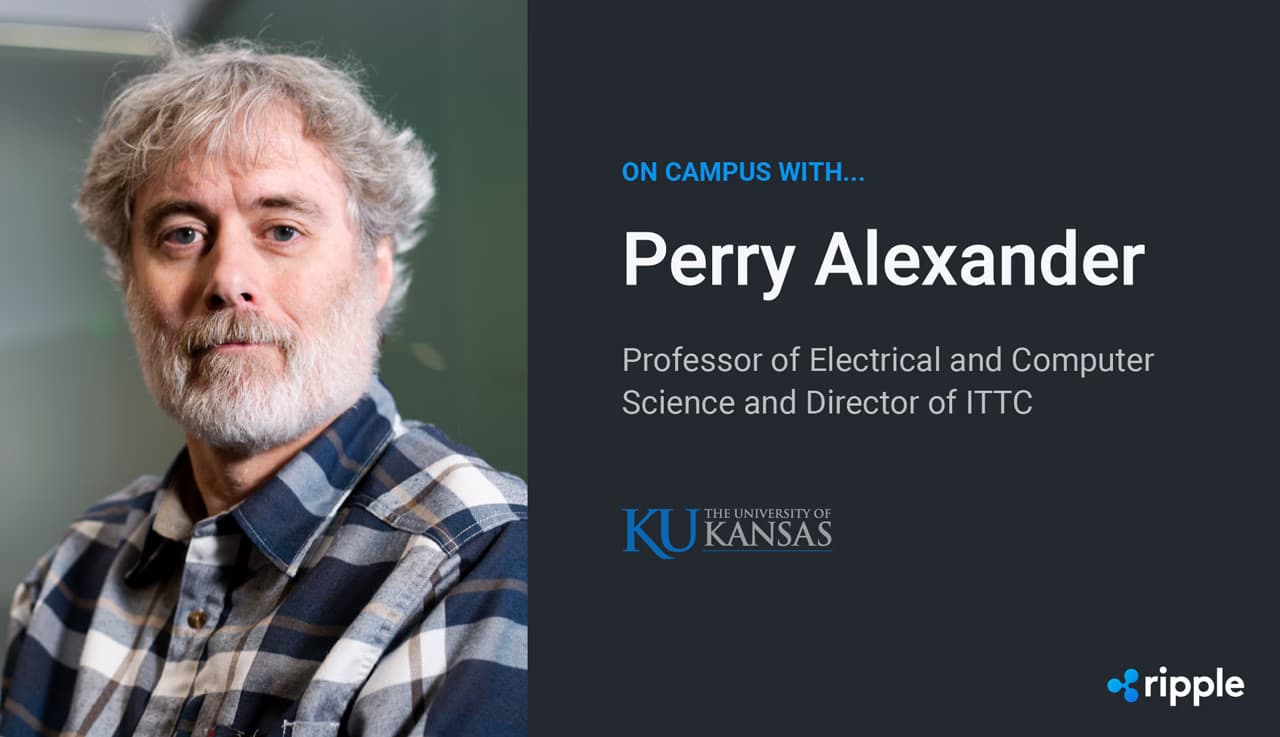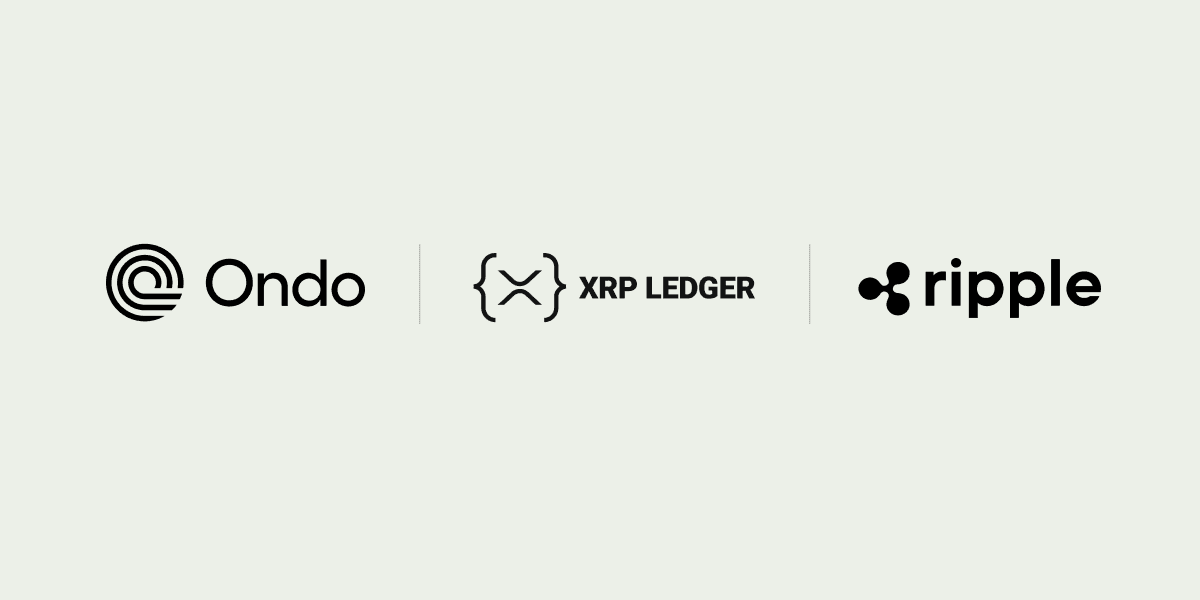This edition of On Campus provides us with a fascinating look at how the University of Kansas (KU) blends academia and blockchain in many compelling and sometimes unexpected ways as part of Ripple’s University Blockchain Research Initiative (UBRI).
Across multiple conversations with Professor Perry Alexander, we explored the university’s deployment of a XRP Ledger validator, its cybersecurity-related research into blockchain with the NSA, and unique interdisciplinary projects in biodiversity and visual arts—all as part of Alexander’s hope to create the next generation of entrepreneurs.
Tomorrow’s Innovators
Professor Alexander fundamentally believes that the study of blockchain and other new technologies is the foundation to building the entrepreneurs and workforce of tomorrow. He observed that industries advance in new technologies as they hire workers that have studied these technologies more extensively and are more familiar with how to apply and manage them.
That’s why he believes ubiquitous commercial applications for blockchain are still a generation of startups away. Current and future students need time to explore and manipulate blockchain—especially in the context of interdisciplinary study—so they are better attuned to how they can more widely commercialize the technology.
He was adamant that while blockchain is a fascinating technology on its own, it requires people from across the vast spectrum of academia to make it effective. He pointed to his department’s own cybersecurity work as an example. It’s well known that one of the core security flaws in most systems is not technological but rather social in nature: consider the employee who misplaces a badge or password versus a deficiency in technology.
This same integration of sociology is critical when thinking about how to use blockchain to move money between people without banks as intermediaries. This is why Professor is so excited about the chance to engage business, law, psychology and other schools in KU’s blockchain work.
Blockchain for Biodiversity
One of the early examples of this interdisciplinary approach is a project Professor Alexander has initiated through UBRI to test how blockchain can support data access control for biodiversity teams.
While it’s easy to imagine that discovering a new animal or plant would be important to share with the world, the opposite is actually true. Professor Alexander learned that immediately making the discovery of new species public could put it in jeopardy, so scientists employ security controls to protect these new findings.
As part of UBRI, KU is sponsoring joint research with blockchain and biodiversity teams to explore a blockchain-based security protocol for these new discoveries. For example, if an American and Swiss team found a new insect in Mexico, blockchain could encode the rights along with a smart contract to grant access and rights to governments and researchers in all three countries while keeping the information confidential from the rest of the world.
Demonstrating this capability could help funders become more comfortable with sponsoring future efforts. And UBRI provides KU with the chance to prove out the concept.
Blockchain in the Arts
Professor Alexander is also pursuing other intriguing cross-department research projects into blockchain. Based on his past interactions with staff at the university’s Spencer Museum of Art, he is exploring an exhibition on the visualization of different blockchains.
Through a partnership with the visual arts team, he hopes to create an intriguing way for people outside of the computer sciences to discover and potentially be inspired by the technology.
Another possible collaboration with the department and Museum could be a system for cataloguing artwork using blockchain. This could even feature some aspects of the data access control system used for the biodiversity project.
Further, Professor Alexander is approaching some of his colleagues in the English department with ideas for projects. He has asked two well-known science fiction authors to imagine the future with blockchain in some of their writing. He’s excited to see the results, noting that they think longer term than engineers and could come up with some fun concepts.
KU and Cybersecurity
One of the reasons Professor Alexander is so excited about the prospects for UBRI and why it has gained momentum so quickly at KU is because the university was already engaged in blockchain projects. He pointed to the business school’s student-run Blockchain Initiative as an example.
They had been active in learning more about blockchain and even putting on a conference on the subject before KU’s UBRI participation. Now he is excited about opening up more opportunities for the Initiative through additional funding.
Prior to the UBRI grant, Professor Alexander had also been working with his team to set up a XRP Ledger validator. As a NSA Lablet and research partner, his team wanted to set up the validator on campus to better understand the technology.
He was particularly excited about using blockchain in this context because of its potential to move the responsibility for cyber security from the state to the community. In his words: “That’s a big deal.”
As part of UBRI, KU intends to pursue more cybersecurity-related work with the NSA. If that happens, he envisions giving students and other faculty even more hands-on experience with the validator.
He believes that blockchain has a lot to offer when it comes to identity and network resiliency—both fundamental components of cybersecurity. Ultimately, he imagines blockchain being a critical part of aggregated trust approaches that can more effectively manage the enormous scope of devices involved in the Internet of Things.
UBRI as a Game Changer
In the end, Professor Alexander was generous in his comments about Ripple and UBRI—what he termed a “game changer” for KU. He hopes to use the grant to expose more students to the technology in novel ways.
He says students are the best tech transfer mechanism, and that providing them with these opportunities and interactions is the reason a university exists.
By showing them what blockchain makes possible, he hopes to influence the next generation to develop the next economy.
To learn more about UBRI, please visit our UBRI website and look for monthly Insights posts in the On Campus series.







